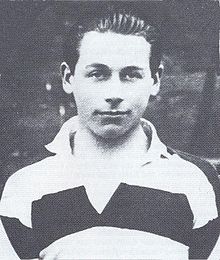Kevin Barry
| Kevin Barry | |
|---|---|

Kevin Barry in the rugby jersey of Belvedere College, Dublin.
|
|
| Born |
Kevin Gerard Barry 20 January 1902 Rathvilly Co.Carlow |
| Died | 1 November 1920 (aged 18) at Mountjoy Jail, Dublin |
| Nationality | Irish |
| Occupation | Medical student |
| Known for | Executed Irish Republican Army volunteer |
Kevin Gerard Barry (20 January 1902 – 1 November 1920) was the first Irish republican to be executed by the British since the leaders of the Easter Rising. Barry was sentenced to death for his part in an Irish Volunteers operation which resulted in the deaths of three British soldiers.
Barry's execution outraged nationalist public opinion in Ireland and its diaspora, largely because of his age. The timing of the execution, only days after the death by hunger strike of Terence MacSwiney, the republican Lord Mayor of Cork, brought public opinion to fever-pitch. His treatment and death attracted great international attention and attempts were made by U.S. and Vatican officials to secure a reprieve. His execution and MacSwiney's death precipitated a dramatic escalation in violence as the Irish War of Independence entered its most bloody phase. Due to his refusal to inform, Barry became one of the most celebrated Irish republicans.
A ballad bearing Barry's name, relating the story of his execution, has been sung by artists as diverse as Paul Robeson,Leonard Cohen,Lonnie Donegan, and The Dubliners.
At the place where Kevin Barry was captured (North King Street/Church Street), there are two blocks of flats named after him.
Kevin Barry was born on 20 January 1902, at 8 Fleet Street, Dublin to Thomas and Mary (née Dowling) Barry. The fourth of seven children, two boys and five sisters, Kevin was baptised in St Andrew's Church, Westland Row. Thomas Barry Sr. worked on the family's farm at Tombeagh, Hacketstown, County Carlow, and ran a dairy business from Fleet Street. Thomas Barry, Sr. died in 1908, aged 56.
His mother came from Drumguin, County Carlow, and, upon the death of her husband, moved the family to nearby Tombeagh. As a child he went to the national school in Rathvilly. On returning to Dublin, he attended St Mary's College, Rathmines, until the school closed in the summer of 1916. When he was thirteen, he attended a commemoration for the Manchester Martyrs, who were hanged in England in 1867. Afterwards he wished to join Constance Markievicz's Fianna Éireann, but was reportedly dissuaded by his family.
...
Wikipedia
